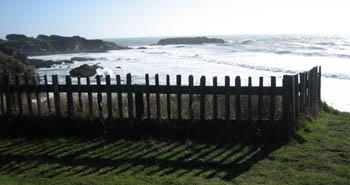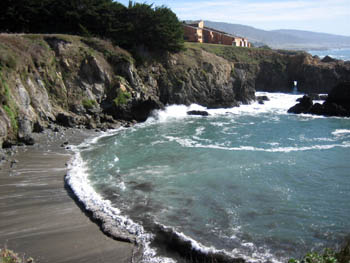
When I was in high school, one of my best friends would occasionally tell me that his parents were spending the weekend at Sea Ranch. I imagined a bunch of cows living by the ocean, and he explained, “No, no cows. There’s, like, golf and stuff.” I would respond, “Cows! Moo!” It turns out that there are indeed cows. Sea ranch is a community of vacation homes along the coast about 120 miles north of San Francisco. I finally went there over the long Presidents Day weekend, and did not want to leave yesterday.

While there, I read an excellent article in the New Yorker about the HP “pretexting” scandal by James Stewart along with a slightly less interesting article about the ramifications of Ruth Lilly’s $200 million gift to the Poetry Foundation. In it, Dana Goodyear portrays opposition to the commercial view of poetry expressed by the foundation’s head, John Barr, whom she quotes, “If you look at drama in Shakespeare’s day, or the novel in the last century, or the movie today, it suggests that an art enters its golden age when it is addressed to and energized by the general audiences of its time.” He seems to be dead on, if he wants to doom poetry to irrelevance. The problem with his view is that art that considers its audience, art that treats its audience like consumers to be pleased and entertained is exactly the sort of art that becomes stagnant, which is, apparently, Barr’s greatest fear.
On my way back from Sea Ranch, I stopped at Green Apple and picked up Joan Acocella’s latest collection of essays, Twenty-Eight Artists and Two Saints, most of which first appeared in the New Yorker. The Times Sunday Book Review has an excellent review of Acocella’s collection by Kathryn Harrison. Harrison writes,
What emerges from a reading of “Twenty-Eight Artists and Two Saints” is Acocella’s — and through hers our own — respect and in certain cases even reverence for the dogged faith on which an artistic career is built. We know the seductive alchemy of art. To transform private anguish into a narrative of truth if not beauty; to make sense where there was none; to bring order out of chaos: these are the promises art makes. Fulfilling them requires something else entirely, an attribute closer to blindness than to inspiration — the refusal to give up when the odds predict defeat, again.
. . . .
“The relation between morality and imagination may be a complicated one, but it does exist,” she writes, analyzing the narrowness of Dorothy Parker’s vision, a function, she believes, of her selfishness. “Hope, forgiveness — these are not just moral actions. They are enlargements of the mind. Without them, you remain in the tunnel of the self.” Like Sontag, like every great critic, Acocella is subjective, uncompromising. She has a distinct point of view, a refreshingly not-fashionable one — she salutes Sunday-school virtues! — and writes from her conviction that beneath its hectic, irresponsible, even intoxicated surface, art makes singularly unglamorous demands: integrity, sacrifice, discipline. Hers is a vision that allows art its mystery but not its pretensions, to which she is acutely sensitive. What better instincts could a critic have?
Before Green Apple, I stopped at the Sausalito Taco Shop, which deserves every one of its five-star ratings on Yelp.